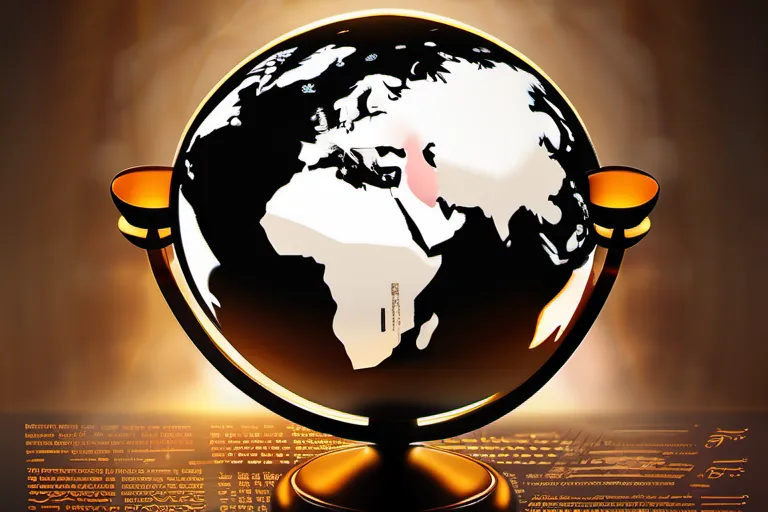Explore the fundamental beliefs, history, and key aspects of Judaism, Christianity, and Islam.
Monotheism is a religious belief that there is only one god. In this article, we delve into the three major monotheistic religions: Judaism, Christianity, and Islam. We will explore their origins, key beliefs, practices, and how they have shaped human history.
The Origins of Monotheism
How did monotheism, the belief in one God, come to shape the world as we know it today? The roots of this profound concept can be traced back to ancient times, a period marked by diverse religious practices and beliefs. From the early polytheistic societies, where gods were seen as numerous and often intertwined with nature and human life, to the emergence of monotheism in Judaism, Christianity, and Islam, the journey is both intriguing and complex.
Imagine a timeline stretching back thousands of years. At its beginning, civilizations worshipped multiple deities, each representing different aspects of nature or societal roles. Over time, this polytheistic worldview began to evolve, with some cultures starting to see these gods as less independent entities and more as manifestations of a higher power.
In this early evolution, the idea of a single, supreme deity started to take shape. This was not just a shift in belief but also a profound change in how people perceived their place in the world. Just like how one tree can overshadow many, the concept of one God began to dominate over the multitude of gods and goddesses.
The emergence of these monotheistic religions—Judaism, Christianity, and Islam—can be seen as pivotal moments in human history. Each religion brought its own unique take on this concept, shaping not just religious practices but also social structures, ethical codes, and even the way people understood their relationship with the divine.
From the Mishnah of Judaism to the teachings of Jesus Christ, and from the revelations of Muhammad to the Koran, these religions have provided a framework for understanding the world. They’ve influenced everything from art and literature to politics and law. Each one has its own scriptures, traditions, and practices that reflect their distinct interpretations of monotheism.
As we explore further into each religion’s history, key beliefs, practices, and impact, it becomes clear how interconnected these faiths are. They share common roots in the concept of a single God but have diverged significantly over time. This exploration will help us understand not only the origins of monotheism but also its enduring influence on human civilization.
Judaism: The Foundations of Monotheism
Judaism, like a sturdy oak, has stood tall for millennia, its roots delving deep into the heart of monotheistic beliefs. Can you imagine a world without the foundational teachings that Judaism laid down? Its impact on Christianity and Islam cannot be overstated; it’s as if these religions are branches growing from the same trunk.
At its core, Judaism is about covenant, a sacred bond between God and His chosen people. This idea of a personal relationship with the divine is quite revolutionary. How could a society or individual relate to a higher power on such intimate terms? It’s like having a close friend who knows you better than anyone else but also guides you spiritually.
The Bible, particularly the Old Testament, is central to Judaism. It recounts stories of prophets and patriarchs, laws and miracles, all woven into a tapestry of divine history. Think about it—how do these tales shape your understanding of what’s right and wrong? They’re like ancient maps guiding people through life.
Practices in Judaism are also rich with significance. Shabbat, for example, is a day of rest and reflection, a reminder to pause from the chaos of daily life. It’s akin to taking a breath of fresh air after running a marathon; it rejuvenates the soul. The dietary laws, or Kashrut, reflect purity and respect for God in every meal. What would your life be like if you considered each bite through this lens?
The history of Judaism is marked by resilience and adaptability. From the Babylonian Exile to the establishment of Israel, it’s a journey of survival and revival. How has this experience influenced modern Jewish identity? It’s as if the people carried their traditions in their hearts, waiting for the day when they could thrive again.
Christianity: A New Era of Monotheism
Imagine stepping back in time to the bustling streets and temples of ancient Jerusalem, where prophets once walked and spoke to crowds. Judaism laid the groundwork for monotheism as we know it today, but from there, a new era emerged—Christianity. This chapter delves into Christianity’s origins, development, and its branches within the context of monotheism.
Christianity began in the 1st century CE, emerging from Judaism. Its central figure, Jesus Christ, claimed to be the Messiah prophesied in Jewish scripture. Christians believe He was not only a prophet but also God incarnate, bringing new teachings and commandments.
The early Christian community faced persecution, yet it grew rapidly due to its message of salvation through faith. Paul of Tarsus played a crucial role by spreading Christianity beyond Jerusalem’s borders, establishing churches in major cities like Rome and Corinth. This expansion was not just geographical but also doctrinal, leading to the development of different Christian communities with varying interpretations.
Over time, two main branches emerged: Orthodox and Non-Orthodox Christianity. The Orthodox branch includes Eastern Orthodoxy (Russian, Greek, etc.) and Oriental Orthodoxy. These traditions emphasize tradition and ritual over innovation, maintaining close ties to early Christian practices.
The Non-Orthodox branch is further divided into various denominations like Catholicism, Protestantism, and Anglicanism. Each of these has its unique history, teachings, and beliefs. For instance, Catholicism focuses on the authority of the Pope and sacraments, while Protestants emphasize individual Bible reading and personal faith.
Despite their differences, all branches share common roots in Jesus Christ’s teachings and seek to understand His message through various theological lenses. The evolution of Christianity has been marked by doctrinal disputes, cultural integration, and missionary work, shaping societies worldwide with its moral and ethical principles.
From a historical perspective, Christianity’s impact on the world cannot be overstated. It has influenced art, literature, politics, and daily life in countless ways. Its beliefs about redemption, sin, and salvation continue to resonate with millions of people around the globe, making it one of the most significant religions in human history.
Islam: The Spread of Monotheism
How did Islam change the course of history and spread like wildfire across continents? The answer lies in its origins, beliefs, and practices that resonated deeply with people seeking spiritual guidance amidst turmoil.
Imagine a desert where the whispers of the divine echo through rugged landscapes, guiding seekers to one God. This is where Islam began, born from the prophetic journey of Muhammad.
- Jihad and Tawhid: The concept of jihad, often misunderstood as a call to arms, actually translates to “struggle” or “effort.” It encompasses the struggle within oneself for righteousness, as well as external efforts to promote good. Central to this is tawhid, the belief in the oneness of God.
- Quran and Hadith: The Quran, Islam’s holy book, is seen as the direct word of God, revealed through the angel Gabriel to Muhammad. The Hadith, traditions based on the sayings and actions of Muhammad, provide additional guidance for Muslims in their daily lives.
- Five Pillars of Islam: These fundamental practices bind Muslims together: declaration of faith (shahada), prayer (salat), almsgiving (zakat), fasting during Ramadan (sawm), and pilgrimage to Mecca (hajj).
The spread of Islam was not merely about converting new lands; it was a cultural exchange, a blend of diverse influences that created vibrant societies. From the Iberian Peninsula to Central Asia, Muslims established empires that were centers of learning, trade, and art.
But how did this religion, born in one place, reach across vast distances? Wasn’t it like planting a seed in fertile soil, waiting for it to grow without any effort?
The answer lies in the hearts and minds of those who embraced it. Islam’s message of justice, compassion, and unity struck a chord with many, making converts from every walk of life. It wasn’t just about worship; it was a way of life that promised dignity for all believers.
As we explore more deeply into the lives of Muslims around the world today, one can see how this religion of peace continues to evolve and adapt, addressing modern challenges while preserving its timeless values. What lessons might we draw from Islam’s journey?
Comparing and Contrasting Monotheistic Religions
When we delve into the world of monotheism, Judaism, Christianity, and Islam emerge as the towering giants, each offering a unique perspective on one God. But how do they compare? And what makes them distinctly different?
Let’s start with their core beliefs. In all three religions, there is a shared reverence for monotheism, but the way this belief is interpreted varies significantly. For Judaism, Moses is seen as the lawgiver and the covenant between God and the chosen people is central to their identity. Christians see Jesus Christ as both human and divine, fulfilling a role of messianic prophecy in Jewish tradition. Islam believes in prophets like Moses and Jesus but sees Muhammad as the final prophet who brings a perfected version of monotheism.
Now, let’s look at some key practices. Jews practice Kosher laws for dietary restrictions and have specific rituals such as Sukkot and Pesach. Christians focus on the crucifixion and resurrection of Jesus Christ, with practices like baptism and communion central to their faith. Muslims follow the Five Pillars of Islam: declaration of faith, prayer, fasting during Ramadan, almsgiving, and pilgrimage to Mecca.
Historically, these religions have intertwined and clashed throughout history. The Biblical lands were a battlefield for religious wars, influencing the cultural landscape of Europe and beyond. During the Crusades, Christianity sought to reclaim Jerusalem from Islamic control, leading to complex interactions that shaped medieval politics and culture.
Despite their differences, these religions share common roots and often find themselves in dialogue today. Interfaith initiatives promote understanding and cooperation among adherents, highlighting the universal themes of morality, ethics, and compassion that underpin all three faiths.
As we explore further into The Legacy of Monotheistic Religions, it becomes clear how these belief systems have shaped not only religious practice but also global politics and cultural norms. Each religion’s journey is a testament to the profound impact of monotheism on human civilization, making them indispensable subjects in our quest for understanding.
The Legacy of Monotheistic Religions
How have monotheistic religions, specifically Judaism, Christianity, and Islam, shaped human history? These three faiths share a common thread that runs through the fabric of civilization, much like a golden thread woven into the tapestry of society. Judaism, often seen as the first major monotheistic religion, laid down foundational principles that would later influence the other two. From its ancient roots in Mesopotamia and Israel, Judaism emerged with a strict adherence to one God, setting it apart from polytheistic beliefs.
Christianity followed closely, spreading rapidly across the Roman Empire under the guidance of Jesus Christ, whose teachings were rooted deeply in Jewish traditions yet expanded their scope and reach. This new religion not only challenged existing societal structures but also introduced revolutionary ideas about love, forgiveness, and equality before God.
Muslims, inspired by the revelations to Prophet Muhammad, found a way to merge Judaism and Christianity with a fresh perspective, emphasizing the oneness of God while also addressing socio-political issues. The Qur’an, Islam’s holy book, served as both a religious text and a constitution for its followers, influencing laws, governance, and ethical behavior.
The spread of these religions across continents and through centuries has left an indelible mark on cultures worldwide. They have inspired art, literature, and music; guided moral and social behaviors; and driven scientific and philosophical advancements. How did Judaism’s emphasis on covenant and Christianity’s concept of salvation intertwine to shape the Western world? And how does Islam’s call to prayer echo through the streets of cities from Mecca to Madrid?
The legacy of these monotheistic religions is vast, touching nearly every aspect of life. From the Bible and the Talmud to the Qur’an, these texts continue to be sources of guidance and inspiration for millions around the globe. As we explore further into this guide, consider how these faiths have not only survived but thrived through tumultuous times, adapting to changing societies while preserving core beliefs.
Each step in their journey is a testament to human resilience and the enduring power of belief. How do you see the impact of monotheistic religions shaping your own life and the world around you?
Conclusion
 By understanding the similarities and differences among these monotheistic religions, we gain a deeper appreciation for religious diversity and its impact on global culture.
By understanding the similarities and differences among these monotheistic religions, we gain a deeper appreciation for religious diversity and its impact on global culture.











